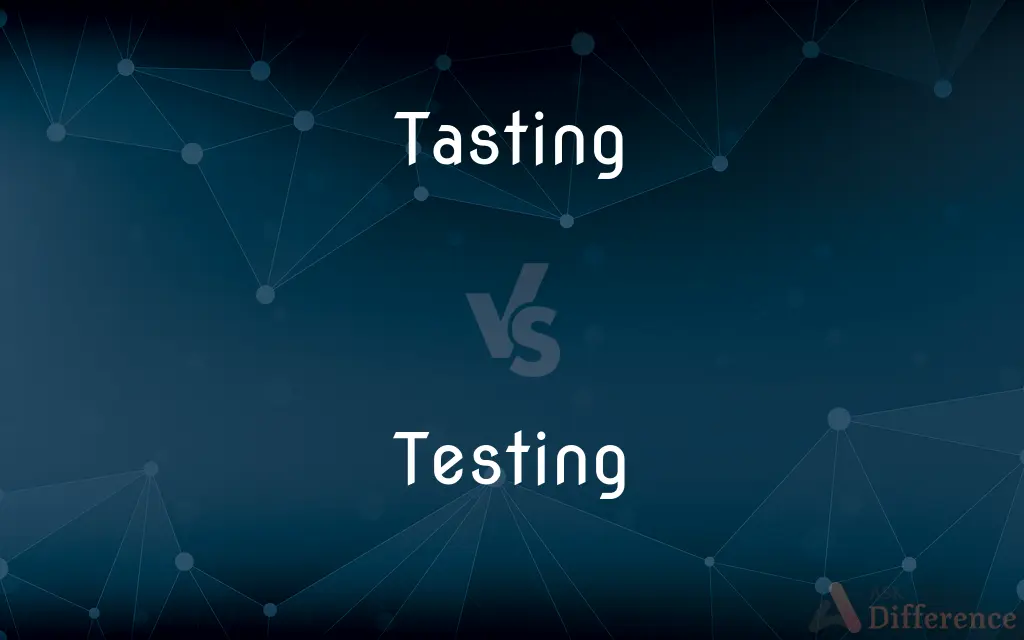Tasting vs. Testing — What's the Difference?
By Fiza Rafique & Maham Liaqat — Updated on March 7, 2024
Tasting involves perceiving flavors through the sense of taste, while testing evaluates characteristics or performance. Both processes assess qualities but in different contexts.

Difference Between Tasting and Testing
Table of Contents
ADVERTISEMENT
Key Differences
Tasting is a sensory experience primarily focused on discerning flavors and textures of food and drink through the taste buds on the tongue. It is a subjective process that relies heavily on individual perception and preferences. On the other hand, testing is a more objective method aimed at assessing the characteristics, quality, or performance of a wide range of items, from materials to software, using specific criteria and tools.
While tasting is largely used within culinary contexts, enabling chefs, sommeliers, and consumers to evaluate food and beverages, testing is applied in various industries and scientific research to ensure products meet certain standards, regulations, or requirements. Whereas tasting can be as simple as savoring a new dish to determine its saltiness, sweetness, sourness, bitterness, or umami, testing often involves structured protocols, experiments, and instruments to provide measurable results.
Tasting is inherently linked to pleasure, exploration, and cultural experiences, often associated with dining, wine tasting, and cooking. It is subjective, with individual differences in taste perception leading to diverse opinions on the same food or drink. Testing, however, seeks to minimize subjectivity by employing standardized methods to ensure reliability and validity of results, catering to quality control, safety, and product development.
In the realm of tasting, descriptors are used to articulate the complex array of flavors, aromas, and mouthfeel experienced, which can include terms like fruity, earthy, spicy, or creamy. Conversely, testing in its various forms such as stress testing, usability testing, or beta testing utilizes metrics, data analysis, and specific terminology relevant to the field to convey findings and conclusions.
Despite their differences, both tasting and testing can involve iterative processes. In tasting, this might mean refining a recipe based on feedback to achieve the desired balance of flavors. In testing, it could involve multiple rounds of tests to troubleshoot and improve a product's design or functionality, demonstrating a shared commitment to enhancing experience or quality through repeated evaluation and adjustment.
ADVERTISEMENT
Comparison Chart
Primary Focus
Evaluating flavors and textures through sense of taste
Assessing characteristics, quality, or performance
Context
Culinary experiences, food, and beverages
Various industries and scientific research
Objectivity
Subjective, based on individual perception
Objective, uses specific criteria and tools
Descriptors
Flavors, aromas, mouthfeel (e.g., fruity, earthy, creamy)
Metrics, data analysis, field-specific terminology
Purpose
Pleasure, exploration, cultural experiences
Quality control, safety, product development
Process
Sensory evaluation without structured protocols
Structured protocols, experiments, instruments
Outcome Influence
Individual preferences and perception
Standardized methods aiming for reliability and validity
Iterative Nature
Refining recipes based on feedback
Troubleshooting and improving design or functionality
Compare with Definitions
Tasting
Evaluating the flavor profile of food or drink.
The chef insisted on tasting the sauce to ensure it had the perfect balance of herbs.
Testing
Assessing student knowledge through exams.
The school is testing students on their mathematics skills.
Tasting
Gauging the spice level of a dish.
She was tasting the curry to decide if more chili was needed.
Testing
Evaluating a product's durability.
The team is testing the phone case's resistance to drops.
Tasting
Identifying distinct notes in wine.
During the wine tasting, participants noted hints of oak and berry.
Testing
Measuring software performance.
We're currently testing the new app for any bugs or glitches.
Tasting
Experiencing new culinary delights.
Traveling offers the opportunity for tasting diverse cuisines.
Testing
Checking the usability of a website.
User testing is crucial for ensuring the website's navigational ease.
Tasting
Testing the freshness of ingredients.
Tasting the fish is essential to confirm its freshness before cooking.
Testing
Conducting experiments in a lab.
Testing the chemical compound required precise measurements.
Tasting
To distinguish the flavor of by taking into the mouth.
Testing
Revealing a person's capabilities by putting them under strain; challenging
It's been quite a testing time for all of us
Tasting
To eat or drink a small quantity of.
Testing
A procedure for critical evaluation; a means of determining the presence, quality, or truth of something; a trial
A test of one's eyesight.
Subjecting a hypothesis to a test.
A test of an athlete's endurance.
Tasting
To partake of, especially for the first time; experience
Prisoners finally tasting freedom.
Testing
A series of questions, problems, or physical responses designed to determine knowledge, intelligence, or ability.
Tasting
(Archaic) To appreciate or enjoy.
Testing
A basis for evaluation or judgment
"A test of democratic government is how Congress and the president work together" (Haynes Johnson).
Tasting
To distinguish flavors in the mouth.
Testing
(Chemistry) A physical or chemical change by which a substance may be detected or its properties ascertained.
Tasting
To have a distinct flavor
The stew tastes salty.
Testing
A cupel.
Tasting
To eat or drink a small amount.
Testing
To subject to a test; try
Tested the pen by scribbling on scrap paper.
Testing job applicants.
Tasting
To have experience or enjoyment; partake
Tasted of the life of the very rich.
Testing
To reveal the degree of (a given quality) in someone or something by or as if by means of a test
The experiment tested the rats' ability to solve spatial problems. The long war tested the country's resolve.
Tasting
The sense that distinguishes the sweet, sour, salty, and bitter qualities of dissolved substances in contact with the taste buds on the tongue.
Testing
To identify the presence or amount of one or more substances in
Tested the water for lead.
Tasting
This sense in combination with the senses of smell and touch, which together receive a sensation of a substance in the mouth.
Testing
To identify the amount of (a substance) in something
Tested the nitrogen and phosphorus in the soil.
Tasting
The sensation of sweet, sour, salty, or bitter qualities produced by a substance placed in the mouth.
Testing
To ascertain the properties of
Tested the steel for hardness and tensile strength.
Tasting
The unified sensation produced by any of these qualities plus a distinct smell and texture; flavor.
Testing
To assay (metal) in a cupel.
Tasting
A distinctive perception as if by the sense of taste
An experience that left a bad taste in my mouth.
Testing
To undergo a test.
Tasting
The act of tasting.
Testing
To administer a test
Test for acid content.
Test for the presence of an antibody.
Tasting
A small quantity eaten or tasted.
Testing
To achieve a score or rating on tests
Tested high on the entrance exams.
Tasting
A limited or first experience; a sample
"Thousands entered the war, got just a taste of it, and then stepped out" (Mark Twain).
Testing
To exhibit a given characteristic when subjected to a test
Test positive for the tubercle bacillus.
Tasting
A personal preference or liking
A taste for adventure.
A play that was not to my taste.
Testing
; tough.
Tasting
The ability to recognize and appreciate what is beautiful, excellent, or appropriate
Has good taste in clothes.
Testing
The act of conducting a test; trialing, proving.
Tasting
The sense of what is proper, seemly, or least likely to give offense in a given social situation
A remark made in bad taste.
Testing
Present participle of test
Tasting
(Obsolete) The act of testing; trial.
Testing
The act of testing or proving; trial; proof.
Tasting
A small amount of food or drink.
Testing
The operation of refining gold or silver in a test, or cupel; cupellation.
Tasting
The taking of a small amount of food or drink into the mouth in order to taste it.
Testing
The act of subjecting to experimental test in order to determine how well something works;
They agreed to end the testing of atomic weapons
Tasting
Present participle of taste
Testing
An examination of the characteristics of something;
There are laboratories for commercial testing
It involved testing thousands of children for smallpox
Tasting
The act of perceiving or tasting by the organs of taste; the faculty or sense by which we perceive or distinguish savors.
Testing
The act of giving students or candidates a test (as by questions) to determine what they know or have learned
Tasting
A small amount (especially of food or wine)
Tasting
A kind of sensing; distinguishing substances by means of the taste buds;
A wine tasting
Tasting
Taking a small amount into the mouth to test its quality;
Cooking was fine but it was the savoring that he enjoyed most
Common Curiosities
What is tasting?
Tasting is perceiving and evaluating the flavors, textures, and overall sensory experience of food and beverages.
What is testing?
Testing involves assessing the characteristics, performance, or quality of various items using specific criteria and methods.
What industries rely heavily on testing?
Industries such as manufacturing, technology, healthcare, and education rely heavily on testing for quality control and research.
Why is tasting important in culinary arts?
Tasting is crucial in culinary arts for ensuring the balance of flavors and overall quality of dishes.
What types of testing are there?
There are various types of testing, including software testing, product durability testing, and scientific experimentation.
What role does testing play in product development?
Testing plays a critical role in product development by identifying issues, ensuring safety, and meeting consumer expectations.
Can tasting be used outside of food and beverages?
While primarily associated with food and beverages, tasting can also refer to experiencing or trying out something new in a metaphorical sense.
Can tasting be considered a form of testing?
While tasting can be viewed as a form of testing for culinary products, it is distinct in its focus on sensory experience rather than objective analysis.
How do taste preferences influence tasting outcomes?
Individual taste preferences can significantly influence the outcomes of tasting, making it a highly subjective process.
How do tasting and testing differ in objectivity?
Tasting is subjective and based on individual perception, while testing is objective and employs standardized methods.
Is there a professional career in tasting?
Yes, careers such as sommeliers, food critics, and flavorists specialize in the professional tasting of food, wine, and flavors.
How do cultural differences impact tasting?
Cultural differences can impact tasting by influencing flavor preferences and perceptions of what constitutes a desirable taste experience.
How do testers document their findings?
Testers document their findings using detailed reports, metrics, and data analysis to convey results and recommendations.
Can testing ensure a product's success?
While testing can significantly reduce the risk of failure by improving quality and safety, it cannot guarantee a product's success in the market.
What skills are required for effective testing?
Effective testing requires analytical skills, attention to detail, and knowledge of specific testing methodologies and tools.
Share Your Discovery

Previous Comparison
Rafter vs. Spar
Next Comparison
Capsulation vs. EncapsulationAuthor Spotlight
Written by
Fiza RafiqueFiza Rafique is a skilled content writer at AskDifference.com, where she meticulously refines and enhances written pieces. Drawing from her vast editorial expertise, Fiza ensures clarity, accuracy, and precision in every article. Passionate about language, she continually seeks to elevate the quality of content for readers worldwide.
Co-written by
Maham Liaqat













































